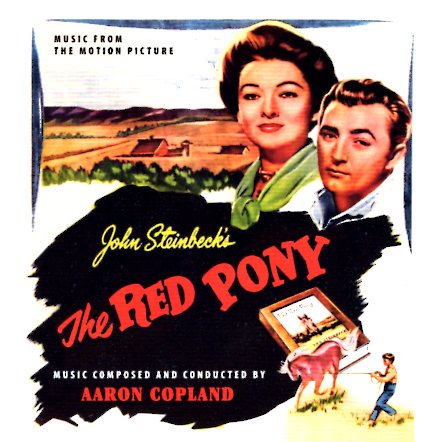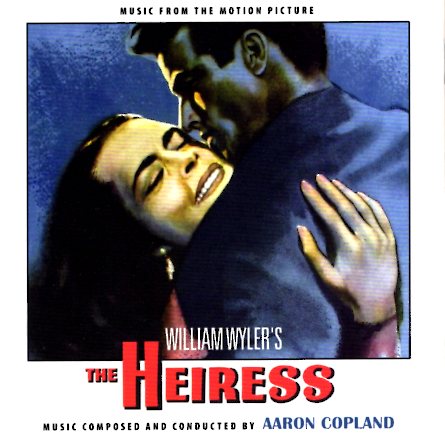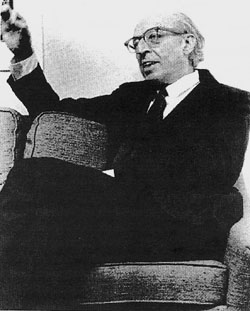
CD Review: Two Aaron Copland Film Scores
THE RED PONY and THE HEIRESS
Music composed and conducted by Aaron Copland.
CD Executive Producers: Douglass Fake and Roger Feigelson
Project Consultant: Lukas Kendall
Audio Restoration: Christ Malone
Edited and Mastered by Douglass Fake
CD Art Direction by Kay Marshall
Design Consultant: Joe Sikoryak
Production Manager: Regina Fake
Editorial Coordinator: Frank K. DeWald
Booklet Notes by Jim Lochner
THE RED PONY (recorded March 16-26, 1948) - 30:20
THE HEIRESS (recorded December 20-31, 1948) - 24.46
"The Extras" - 12:26
Total CD Playing Time = 67:48
INTRADA FSC 373
Rating: ****

In 1980, I had the great honor and pleasure to interview Aaron Copland at his home and asked him about his film scores of the 1940s. One score he was especially fond of was OUR TOWN (1940), for which he was Oscar-nominated.
The two film scores included on this CD were also mentioned by Copland in our conversation. They are both among Copland's best scores of the 1940s.
THE RED PONY was based on a John Steinbeck novelette and was ideally suited for the kind of music that Copland had composed for his "cowboy" ballets":
BILLY THE KID (1938)and RODEO (1942). So he was prepared for this task.
As Jim Lochner writes in his excellent notes, "When Tommy's imagination turns chickens into circus animals," Copland achieved "unusual effects ...through overlapping incoming and outgoing music tracks." This one cue indicates that Copland had the good sense to turn this simple scene into a memorable musical moment to go along with the visuals in the film. This thirty minute score is given in its complete form for the first time.
Lochner also provides several quotes from newspaper reviews.
When writing about this score, a reviewer from The Christian Monitor wrote:
"Aaron Copland's musical accomplishments...are the most elegant, in my opinion, yet composed and executed under 'industry conditions,' as Hollywood nowadays calls itself."
And Copland's fellow composer, Virgil Thomson, wrote in his New York Herald Tribute newspaper review that
"Mr. Copland has made it all interesting, various, expressive."
This is one of the great film scores of the late 1940s.

This Paramount Picture was from a 1947 play by Ruth and Augustus Goetz, which had been based on an 1880 novel by Henry James, this was a winner of four Oscars, including one for actress Olivia de Havilland, who gave a luminous performance, and one for Copland's dramatic score.
Even though it is a lovely tune, the old French song, "Plaisir d'Amour," was inserted into Copland's Main Title opening without his permission. He objected to this substitution to the press, writing that he was "disclaiming responsibility for that part of the score." The insertion of "Plaisir d'Amour" in the Main Title opening was arranged by orchestrator, Nathan Van Cleave. As quoted by Jim Lochner, film composer and conductor, Andre Previn wrote in his very witty book, No Minor Chords, that Van Cleave's arrangement of the song in the Main Title was "slick, pretty, and utterly vapid. Then suddenly...there is a sudden shift, and Copland's music takes over, spare and angular and gorgeous.
It's like suddenly finding a diamond in a can of Heinz beans."
Since it had been selected by director, William Wyler, Copland did use "Plaisir d'Amour," in several of the love scenes. Unlike THE RED PONY, Copland's music was much more intense and especially the final scenes. As first written, Copland's upbeat theme for the most dramatic scene caused the audience to laugh. But after he composed a more intense musical cue, nobody in the audience laughed at it, proving the value of a great composer knowing how to adjust his music for a key film scene.
The 24 minutes of the score are not of the highest sound quality due to the original acetate discs, but still this music is well worth having in this first complete recording of the score. There are also 10 minutes of extra music, mostly the dance music
adapted by Van Cleave.
A "Musicians Roster" is provided for all the musicians who performed on both original studio recordings. I was surprised to see that future film composer and Oscar winner, Harry Sukman, was listed as a pianist in the list of musicians used for THE HEIRESS studio recording.
The sound restorations by Chris Malone are outstanding.
Both of these film scores are worth adding to your collection.
They illustrate the memorable music
composed by one of America's greatest composers,
and not just for films.
Bravo to all concerned in making these two Copland film scores available in their complete original recordings!
They are both musical treasures.
Highest recommendation.
-- Roger Hall, March 2017
Read the Mr. Hall's interview with Aaron Copland -- click here
Aaron Copland was named posthumously for a Lifetime Achievemebt Sammy Film Music Award. Read the description
-- click here

The 1980 interview by Roger Hall with Aaron Copland
is available on two CDs:
"A Conversation with Aaron Copland" (AMRC 0005)
-- click here
"Aaron Copland On Film Music" (AMRC 0019) - click here
For your comments or questions send to:
Film Music Review
Please help support the preservation efforts of
Film Music Review
Order music books, CDs, DVDs at the
AMP Store

Film Music Review (Home Page)
Return to top of the page
